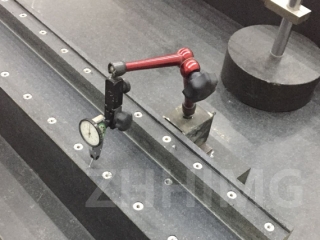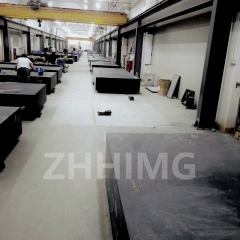In the glass processing industry, the precision and stability of glass cutting equipment directly determine the product quality and production efficiency. Granite bases play an indispensable role in glass cutting equipment, mainly due to their unique and superior characteristics.
Outstanding stability ensures cutting accuracy
Glass cutting has extremely high precision requirements. Even the slightest deviation can lead to the scrapping of the product. The granite base was formed over a long geological period, with a dense and uniform internal structure. Its coefficient of thermal expansion is extremely low, only (4-8) ×10⁻⁶/℃, and its size hardly changes when the temperature varies. During the glass cutting process, the heat generated by the operation of the equipment and the fluctuations in the workshop environment temperature will not cause obvious thermal deformation of the granite base. It can always provide stable and reliable support for the cutting device, ensuring the precise positioning of the cutting tool or laser beam. The cut glass has neat edges and accurate dimensions, greatly improving the yield of the products.

Strong rigidity resists external force impact
When the glass cutting equipment is in operation, the contact between the cutting parts and the glass will generate a certain impact force, and at the same time, the movement of the equipment itself will also cause vibrations. Granite is hard in texture and has excellent rigidity. Its hardness can reach 6-7 on the Mohs scale and it has high compressive strength. This enables the granite base to easily withstand various external forces during the cutting process and is less likely to deform or be damaged. Compared with some metal bases that may undergo fatigue deformation under long-term and frequent external forces, granite bases, with their strong rigidity, can always maintain a stable structure, ensuring the long-term stable operation of equipment and reducing equipment maintenance and downtime caused by base problems.
Outstanding damping performance reduces vibration interference
Vibration is one of the important factors affecting the accuracy of glass cutting. If the vibration generated during the operation of the equipment cannot be attenuated in time, it will cause the cutting tool or laser beam to shake, resulting in problems such as rough cutting surfaces and uneven cutting lines. Granite has excellent damping performance. Its complex mineral structure and tiny pores inside are like natural vibration absorbers. When the vibration is transmitted to the granite base, these structures and pores can quickly convert the vibration energy into heat energy and dissipate it, greatly reducing the interference of vibration on the cutting process. For instance, in high-speed laser glass cutting equipment, the granite base can effectively suppress the vibration of the laser head, ensuring that the laser beam stably acts on the glass surface and achieving high-precision and high-quality cutting results.
Good wear resistance extends the service life of the equipment
During the long-term operation of the glass cutting equipment, the base will generate certain friction with the cutting components, glass materials, etc. Granite has good wear resistance due to its high hardness and dense structure. Take the cutting workbench surface as an example. It is made of granite and can withstand the friction caused by frequent glass placement and movement of cutting components, and is less likely to have problems such as wear and scratches. This not only ensures the flatness of the base surface and maintains the high precision of the equipment, but also significantly extends the service life of the base and even the entire glass cutting equipment, reducing the equipment renewal costs of enterprises.
Non-magnetic, avoiding electromagnetic interference to the cutting process
In some advanced glass cutting equipment, electronic components and precision sensors are used to control the cutting accuracy and position. The possible magnetism of the metal base may cause electromagnetic interference to these electronic devices, affecting their normal operation and the accuracy of signal transmission. Granite, on the other hand, is a non-metallic material with no magnetism and will not cause any electromagnetic interference to the electronic systems inside the equipment. This enables the glass cutting equipment to operate in a stable electromagnetic environment, ensuring the accurate transmission of various control signals during the cutting process, and further enhancing the cutting accuracy and the reliability of equipment operation.
In conclusion, granite bases, with their outstanding stability, strong rigidity, excellent damping performance, good wear resistance and non-magnetism, have become the ideal choice for glass cutting equipment, providing a solid guarantee for the glass processing industry to achieve high-precision and high-efficiency production.
Post time: May-19-2025

